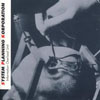
While they might not be as lauded as their contemporaries, at least in relative terms, the Graeme Revell fronted SPK was one of the essential contributors to "industrial" music, as well as the various permutations of it that came afterward. This, their debut full-length album, carefully balances the abrasive harshness, but also hints of moody, depressive ambience that would define their future.
Side Effects/Mute
SPK has always been, at least to me, one of the "big three" innovators in early industrial music, alongside Throbbing Gristle and Cabaret Voltaire.However, they always seem to be considered third on that list, and I can’t completely understand why.Perhaps it was because, even at the time, they were one of the more "extreme" practitioners of the genre.Early work, especially Information Overload Unit, was more on the noisy end of the spectrum than the harsher TG stuff, so that may have marginalized them somewhat.Imagery-wise even they leaned towards the more disgusting and confrontational, using autopsy images throughout their work and a skewered penis on the Meat Processing Section single, which definitely out-grossed TG and CV.Or perhaps it was because their transition to more conventional music was more abrupt (and seemingly more forced) then their contemporaries.
Throbbing Gristle broke apart before they had a chance to fully embrace more commercial sounds, and Cabaret Voltaire kept their paranoid, creepy edge when they started adding in danceable beats and actual singing.SPK, on the other hand, went drastically commercial with 1984's Machine Age Voodoo, keeping only the occasional bit of metal percussion from their early days.A recent revisiting of the album just screamed generic 1980s cheesy synth pop, a far cry from their innovative, experimental beginnings.
Information Overload Unit, released in 1980, remains their most aggressive and harsh album, matched only by the "Slogun" single. The original vinyl was split in half, with the "Ultra" A-side consisting of the manic, hostile pieces, while the "Hyper" side is the more bleak and depressive tracks, a sound they would perfect even more on the following Leichenschrei album.
The buzzing feedback and delay-drenched opening of "Emanation Machine R. Gie 1916" sets up the rest of the album perfectly, launching full on into what sounds like malfunctioning machinery crashing onto itself.Roars, feedback, and power tools mask a subtle, but perceptible rhythm undulating low in the mix that eventually is revealed as a rather simple, but effective analog drum machine loop beneath the chaos.
Aggression wise, "Emanation Machine" is matched only by "Berufsverbot," which closes the "Ultra" half of the album.Focusing more on junk metal percussion, it isn’t too far removed from a less theatrical, more hate-filled take on early Neubauten, complete with Revell's barked German vocals."Suture Obsession" brings in a bit of the squalling, damaged guitar sound that characterized their earliest, almost punk work, although tapes, synth noise and an almost buoyant bassline do their best to obscure it.
On the opposite side, "Ground Zero: Infinity Dose" somewhat bridges the two styles, as its pace is slow and plodding, but the sound is more harsh and aggressive.Rather than barked or screamed vocals, here they are processed beyond recognition, like the smallest piece of humanity left in a mechanized disaster.The remaining tracks tend to be more restrained, focusing a lot on slow, reverberated analog beats and the occasionally raw synth stab, especially on "Stammheim Tortukammer" and "Retard.""Epilept: Convulse" is the closest thing to an actual "song" on this album:a steady synthetic rhythm and noisy, but restrained electronic swells appear throughout, never pushing into the world of pure noise, but with a greater sense of structure and direction compared to the other tracks.
While SPK diversified their sound more after this album, Information Overload Unit remains probably their harshest and most dissonant work, without which I doubt the death industrial scenes of Cold Meat Industries and Tesco would exist.Although it definitely leans into formless noise, there is a rhythmic undercurrent that sets it apart and gives it its identity.Leichenschrei is a bit more fleshed out and fully realized in comparison, but this album is an important piece of their history, as well as the entire spectrum of dark and aggressive music.
samples:
 
Read More

